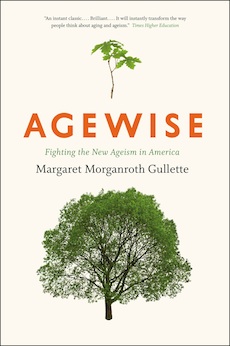By Germane Cornelissen-Guillaume
Agewise is an eloquent fight against ageism, the stereotyping of and discrimination against individuals because of their age. It is also propaganda against the consumerism fueling fears of aging and making the illusion of youthful perfection glitter. Margaret Gullette’s scholarship draws from history, economics, social and political studies, biomedical, psychology and other literary works to offer a positive view on aging to counter what she calls the decline ideology, to which all of us are exposed, at all ages. It may start in childhood, when stereotypes against others seep in, and turning against self later, tainting imagination, damaging perceptions, and spoiling life expectations.
Whereas ageism alone cannot be solely blamed for the recent economic meltdown, the author offers plentiful examples where being too old is too large a part of the problem to be ignored, with dire consequences also in terms of health care. Elders used to be respected for their wisdom and vast, lifetime experience. But the erosion of seniority and respect for aging are diminishing the self-esteem of many midlife workers who are being marginalized because of age, even leading some to suicide. Examining reasons why excess deaths are suffered by age in catastrophic situations such as Hurricanw Katrina, Gullette also identifies multiple discriminations.
Menopause demonization and the hype of hormonal replacement therapy are presented as two linked phenomena underpinning women’s dread of aging and the fantasy of anti-aging medicine. Cosmetic surgery is attacked next for the lack of coverage of pain, disfigurement, and even death. Mortality and complication rates are, apparently, markedly higher than for surgeries necessary for the treatment of disease. The author also makes the case that ageism needs to be fought so as not to deny and obscure the physical beauty and sexual expression in later life.
The book includes personal stories as well. In her essay on forgetfulness, Gullette warns us that the fear of memory loss may be exaggerated, a danger to our human relations, our mental health and public policy. She emphasizes a progress narrative that promises children not a charmed life but a resilient self. Progress is also the foundation of her Free High School for Adults in San Juan del Sur, Nicaragua, where the under-privileged are offered a free education.
While this book deals with ageism and not aging, it is the (chrono)physiology of aging from which we may draw some insight, as evidenced by the following two examples. Every day, our peak expiratory flow changes by much more than it does during a lifetime [Journal of Gerontology, 36.1 (1981): 31-33]. Aging studies based on single samples can yield opposite results, even when the time of day of measurement is fixed. For instance, when changes with age affect the daily (circadian) extent of change and not the daily mean, and measurements are taken either at the daily peak or at the daily trough, an increase or a decrease with age will be observed, as in the case of time estimation [Clinical Interventions in Aging, 3.4 (2008): 749-760]. Both examples support Gullette’s point that aging should not be equated with decline. They also illustrate that aging cannot be discussed without the awareness of the many cycles that shape our physiology, a fascinating topic in its own right that we hope the author may pursue in her next book?
Germaine Cornelissen-Guillaume is a professor of integrative biology and physiology and director of the Halberg Chronobiology Center at the University of Minnesota, Twin Cities.
This review previously appeared in our print edition, The Key Reporter, 76.3 (2011): 12.




